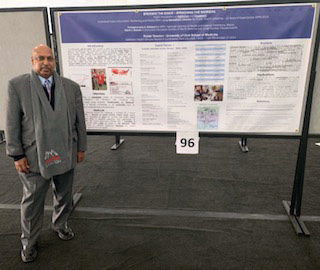
Punyamurtula S. Kishore, along with his associate Mark J. Danalis, presented the Community Education Center model, pioneered in Waldoboro by the National Library of Health and Healing, at the Addiction Health Services Research Conference in Utah on Oct. 17.
Punyamurtula S. Kishore, along with his associate Mark J. Danalis, from East Longmeadow, Mass., presented the community education center model pioneered in Waldoboro by the National Library of Health and Healing, at the Addiction Health Services Research Conference in Utah on Oct. 17.
Hosted by the University of Utah’s Department of Internal Medicine and the Division of Epidemiology’s Program for Addiction Research, Clinical Care, Knowledge, and Advocacy, the Addiction Health Services Research Conference is an annual meeting place for up to 350 of the nation’s preeminent scientists and researchers working on solutions to the addiction epidemic affecting the country.
Kishore, trained at the Harvard School of Public Health in the science of community diagnosis, community-oriented primary care, community responsive care, and disease mapping under leading public health scientists, has a lifelong interest in community education, and worked to bring health-related education and knowledge to communities across New England and nationally.
Kishore’s presentation, titled “Bridging the Divide: Breaching the Barriers — Public Perceptions of Addiction and Treatment, Innovative Public Information, Marketing, and Media Effort using Specialized Libraries for Public Health Initiatives, 25 Years of Experiences 1993-2018” was one of the 98 poster presentations considered innovative and showcased at the conference.
Former U.S. Secretary of Health, Education, and Welfare Joseph A. Califano Jr., in the Carter administration, and chief domestic advisor to President Lyndon Johnson, founded the Center for Addiction in New York to track the state and federal spending on substance use disorders. The center’s website states that each year federal, state, and local governments spend close to $500 billion on addiction and substance use. However, for every dollar that federal and state governments spend, only one cent of every dollar goes to prevention and treatment, while 84 cents of every dollar goes to pay for the consequences of the failure to prevent and treat risky substance use and addiction.
Per Center for Addiction estimates, Maine spends 27.3% of the state budget on addiction-related care, with one cent on every dollar going for prevention and treatment, while 99 cents on every dollar pays for consequences.
Studies have shown the annual cost of substance abuse to the nation to be $510.8 billion in 1999 (see Harwood, 2000). More specifically, alcohol abuse cost the nation $191.6 billion. Tobacco use cost the nation $167.8 billion. Drug abuse cost the nation $151.4 billion.
Substance abuse clearly is among the most costly health problems in the United States. Among national estimates of the costs of illness for 33 diseases and conditions, alcohol ranked second, tobacco ranked sixth, and drug disorders ranked seventh, according to the National Institutes of Health, in 2000. This report shows that programs designed to prevent substance abuse can reduce these costs according to Substance Abuse and Mental Health Administration publication “Substance Abuse Prevention Dollars and Cents: A Cost-Benefit Analysis.”
The mission of the National Library of Health and Healing is to find indigenous solutions to local issues. It aims to fill the knowledge deficits that exist unevenly in different communities.
The Waldoboro-based Knowledge Company has currently branched into Massachusetts under the direction of Danalis and is on track to be a regional powerhouse in community and public health education, with sites due to open in Connecticut and New Hampshire.
The National Library of Health and Healing serves as a community education center, research facility, and neutral gathering place for individuals, families, and communities to exchange ideas and to further the development of methodologies to redress the issues that come to the community’s attention. Those interested in joining the National Library of Health and Healing effort or starting a local community education center can request additional background information by calling or texting 617-953-8994 or emailing psk@pmai.net. Interested parties can also mail a request to P.O. Box 111, Waldoboro, ME 04572.






